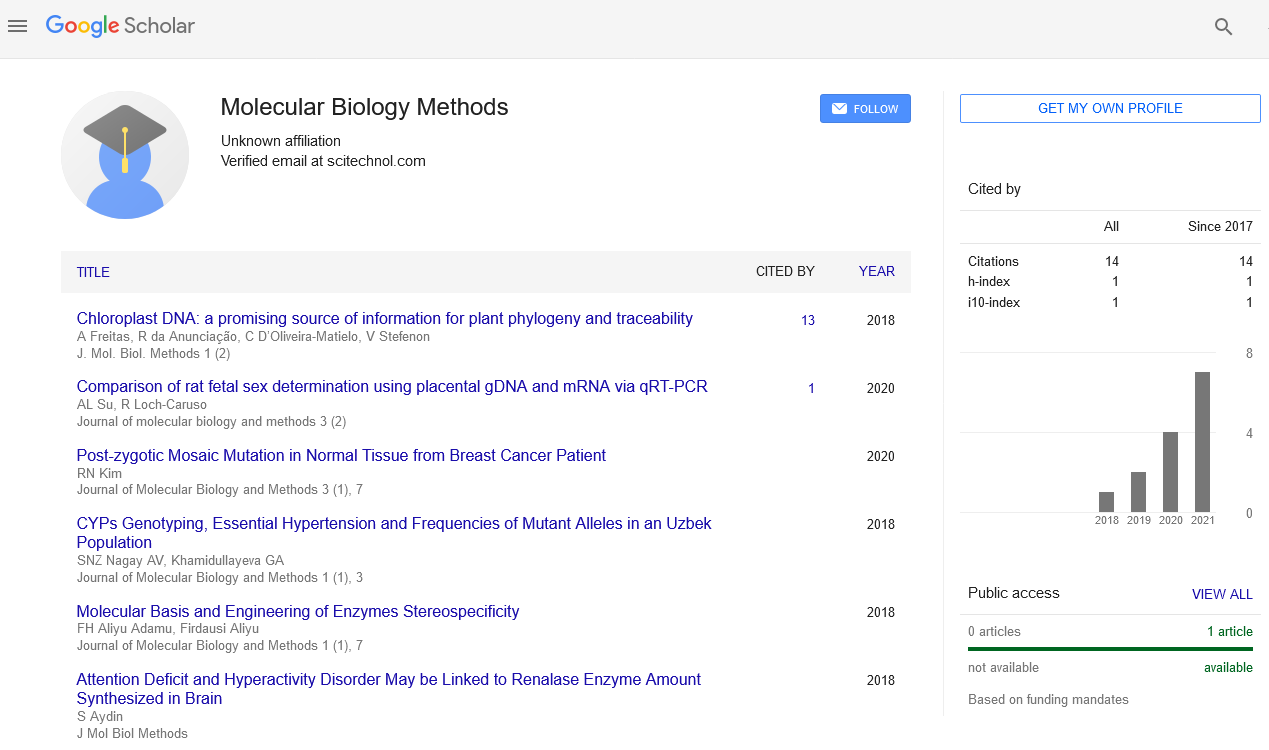Opinion Article, J Mol Biol Methods Vol: 6 Issue: 4
Exploring the Complexity of Epigenetics and It's Future Innovations
Joao Freire*
1Department of Physiology and Pharmacology, Federal University of Ceará, Fortaleza, Brazil
*Corresponding Author: Joao Freire,
Department of Physiology and
Pharmacology, Federal University of Ceará, Fortaleza, Brazil
E-mail: joao_freire@gmail.com
Received date: 27 November, 2023, Manuscript No. JMBM-24-124365;
Editor assigned date: 30 November, 2023, PreQC No. JMBM-24-124365 (PQ);
Reviewed date: 14 December, 2023, QC No. JMBM-24-124365;
Revised date: 21 December, 2023, Manuscript No. JMBM-24-124365 (R);
Published date: 28 December, 2023 DOI: 10.5958/jmbm.1000153
Citation: Freire J (2023) Exploring the Complexity of Epigenetics and It's Future Innovations. J Mol Biol Methods 6:4.
Description
In the realm of biological sciences, the concept of epigenetics has emerged as a pivotal area of study, illuminating the intricate mechanisms that govern gene expression and cellular differentiation. Epigenetics, a field nestled at the crossroads of genetics and environmental influences, elucidates how external factors can modulate gene activity without altering the underlying DNA sequence.
At its core, epigenetics encompasses an array of modifications that orchestrate gene expression by regulating the accessibility of DNA to cellular machinery. Unlike alterations in the DNA sequence itself, which constitute mutations and are relatively stable across generations, epigenetic changes are reversible and highly responsive to various stimuli. These modifications act as molecular switches, dictating whether a gene is turned on or off, thus influencing an organism's traits and characteristics.
Central to the landscape of epigenetic modifications are chemical tags, such as methyl groups and histone modifications, which act as dynamic regulators of gene expression. DNA methylation, the addition of methyl groups to specific regions of DNA, typically results in the silencing of genes, preventing their transcription into proteins. Meanwhile, modifications to histone proteins the spools around which DNA is wound can alter the chromatin structure, either promoting or inhibiting access to the genetic information encoded within DNA.
Furthermore, the environmental factors that we encounter throughout our lives ranging from diet and stress to pollutants and lifestyle choices can exert a profound influence on epigenetic modifications. Studies have highlighted how maternal nutrition during pregnancy, for instance, can induce epigenetic changes in the developing fetus, potentially impacting its susceptibility to diseases later in life. Similarly, exposure to toxins or stressors can lead to alterations in epigenetic marks, contributing to the onset or progression of various conditions.
One of the most intriguing aspects of epigenetics is its role in the trans-generational transmission of traits. While the DNA sequence remains largely unchanged across generations, epigenetic alterations can be inherited and passed down from parent to offspring. This phenomenon, termed trans-generational epigenetic inheritance, has been observed in diverse species and has significant implications for evolutionary biology and medicine. It suggests that experiences and environmental exposures of previous generations could influence the health and traits of children.
Moreover, epigenetics plays a pivotal role in development, ensuring the precise cooperation of cellular differentiation and specialization. During embryonic development, cells undergo a series of epigenetic modifications that dictate their fate whether they will become nerve cells, muscle cells, or any other specialized cell type. The exquisite regulation of these epigenetic marks determines the proper functioning of organs and tissues within an organism.
The implications of epigenetics extend far beyond developmental biology. In the realm of medicine, this field holds promise for elucidating the underlying mechanisms of various diseases, offering novel avenues for diagnostics, prognostics, and therapeutic interventions. Researchers are exploring how aberrant epigenetic patterns contribute to the pathogenesis of conditions such as cancer, neurological disorders, and metabolic diseases. Understanding these epigenetic signatures could pave the way for targeted therapies that modulate gene expression, potentially reversing or mitigating disease progression.
Furthermore, epigenetic research has unveiled the potential for epigenetic therapies interventions aimed at modifying or reversing detrimental epigenetic changes associated with disease. Approaches such as DNA methylation inhibitors and histone deacetylase inhibitors are being investigated for their therapeutic potential in various cancers and other disorders. These targeted interventions hold promise for personalized medicine strategies tailored to an individual's unique epigenetic profile.
However, the field of epigenetics also faces challenges and ethical considerations. The complexity of epigenetic regulation poses difficulties in fully deciphering and interpreting the vast array of modifications and their interactions. Additionally, ethical dilemmas arise concerning the potential long-term consequences of manipulating epigenetic markers for therapeutic purposes and the implications of altering heritable traits.
The burgeoning field of epigenetics represents a paradigm shift in our understanding of genetics and inheritance. It unravels the dynamic interplay between genes and the environment, elucidating how epigenetic modifications sculpt our biological identity and influence our health and well-being. As research continues to unravel the intricacies of epigenetic mechanisms, the potential for ground breaking discoveries and transformative medical applications continues to expand, holding the promise of revolutionizing healthcare and our understanding of life itself.
 Spanish
Spanish  Chinese
Chinese  Russian
Russian  German
German  French
French  Japanese
Japanese  Portuguese
Portuguese  Hindi
Hindi 